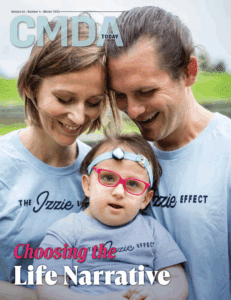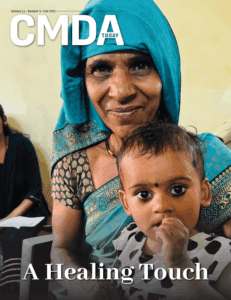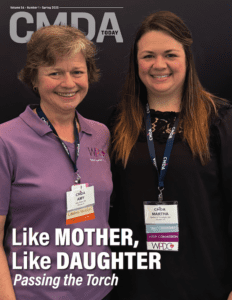Mentoring: All You Need is F.A.I.T.H.
My freshman year of college brought a multitude of surprises. Certainly, there was the increased study load and the idea that I alone had to manage myself, my time and my schedule, yet the biggest surprise I experienced was when the God of the universe radically changed my life and the trajectory of my future.
by Bill Reichart, MDiv
My freshman year of college brought a multitude of surprises. Certainly, there was the increased study load and the idea that I alone had to manage myself, my time and my schedule, yet the biggest surprise I experienced was when the God of the universe radically changed my life and the trajectory of my future.
Through a series of providential encounters upon arriving on campus, Drew, a staff person with Campus Crusade for Christ (now known as CRU), shared with me what it meant to put my faith and trust in Jesus. After a time of questioning and wrestling, I knew I needed to put my trust in Jesus, and I did, and Jesus changed my life. Yet, as life changing as it was encountering the gospel, what was just as transformative was what happened after that. Drew spent time with me. He invested in my spiritual growth and development while demonstrating and modeling what it looks like to follow Christ. He became a friend, spiritual guide and mentor.
Mentoring relationships, like the one I shared with Drew in college, aren’t unique. Christians investing in the lives of each another is pictured throughout Scripture. We see a clear example of that in the relationship between Paul and Timothy. Paul invested in Timothy’s life, so much so that he even brought Timothy with him on his journeys and referred to him as,“…my dear son…” (2 Timothy 1:2). Just like the example of Paul and Timothy, having a heart to invest in others and helping them grow is foundational to Christian mentoring.
God created us not to grow and flourish in isolation but in community with one another. We need believers to pour into our lives as much as we need to, likewise, pour into the lives of others. With all the professional and spiritual challenges healthcare professionals experience, beginning with their training and all the way through into their professional lives and practices, the need for them to be in mentoring relationships is now more important than ever before.
“While I made my living as a coach, I have lived my life to be a mentor, and to be mentored! Constantly. Everything in the world has been passed down. Every piece of knowledge is something that has been shared by someone else. If you understand it as I do, mentoring becomes your true legacy. It is the greatest inheritance you can give to others. It is why you get up every day—to teach and be taught.”
―John Wooden
What is a Mentor?
Within our conversations, a number of words are thrown about that, at first blush, appear to be synonymous with each other. Words such as coach, discipler, consultant, counselor and mentor. Even though there may be some overlap and similarity between them, we can make unique and important distinctions for each term that need to be understood and applied.[1]
Mentor is commonly defined as “a wise and trusted counselor and teacher.” A mentor is often used in the professional realm when a person desires to emulate and learn specific skills from another person who is usually further along professionally than they are. Yet, as we discuss mentoring within the context of our Christian faith, the added dimension of spiritual investment can’t be forgotten or ignored. Therefore, as we discuss mentoring, we are addressing it in terms of both the spiritual and professional dimensions, not exclusive of each other, but especially how they integrate with each other.
Given that mentoring is such a value opportunity for both those who mentor and those who are mentored, why does there seem to be a lack of it? Although one could offer numerous answers to that question, three specific hurdles can prevent someone from considering a mentor relationship.
- Time. Our busyness too often robs us of those things that are most important and scream for our time and attention. A healthcare professional I worked with in Atlanta, Georgia often used to say, “BUSY stands for Being-Under-Satan’s-Yoke.” What he meant is that being busy pulls us away from the things God has for us. We allow the tyranny of the urgent to rob from the things that are important.
- Perfection. This is the belief that we need to have it all together and be the Bible answer person on all issues and subjects in order to mentor. What we will discover is that mentoring is more than just an exchange of content, rather, it’s an opportunity to let Christ work through you. Christ knows the needs of the mentee; therefore, you don’t have to be perfect, nor do you need previous ministry experience or even a particular type of personality.
- Ignorance. We don’t know what mentoring should look like. Often this is the case because many have never been a mentee or a mentor and, therefore, are unclear on how to begin mentoring. Being unclear and uncertain of what mentoring looks like paralyzes us from venturing into the unknown.
“Spiritual mentoring includes a process of listening to the life of another and then teaching people to open their eyes and see what is there—everywhere—teaching them to become detectives for the presence of God.”
—Keith Anderson and Randy Reese, Spiritual Mentoring: A Guide for Seeking and Giving Direction
Being a Mentor Requires Being a Person of F.A.I.T.H.
For those of you wanting to step into the role of mentoring a new Christian healthcare professional just starting their career, what is required? What are the qualifications? The qualifications are simple. Having a perfect life is not a prerequisite. Not at all. Rather simply, all you need to be is a person of F.A.I.T.H.: Faithful, Available, Initiative-taking, Truth-telling, Healthy.[2] Let’s unpack these a little bit more to discover the qualifications of being a mentor.
Faithful
A mentor is faithful to both Jesus and to those being mentored. A mentor is someone who desires to walk with Christ in both humility and obedience and is faithful to those with whom they are in relationship. They are faithful to keep commitments and confidentiality within those relationships.
Available
A mentor is available to the relationship. They make their life accessible to the mentee and commit time to them. A mentoring relationship is like other relationships, in that it requires an investment of time and intentionality. This investment must be bidirectional. Both the mentor and the mentee must invest the time together. The length of time required for mentoring will vary, but a typical mentoring relationship lasts for about one or two years. For a mentor connection to grow and flourish, there must be time for a climate of trust to be built by sharing each other’s lives in deep and meaningful ways. Because of the depth and level of intimacy required in a mentoring relationship, we recommend individuals involved in mentoring be of the same gender.
Initiative-taking
A mentor takes the initiative in making themselves known and knowing their mentee. It is not to say that the relationship is one sided—it isn’t—however, the mentor sets the tone. It is important for the mentor to be vulnerable and open with their life, as that will set the tone for the relationship that develops. Practice vulnerability by being the first to step out and share your story. For example, if you struggle with sin in a particular area of your life, be honest about that with the person you mentor. That will create bonding and help the person you mentor know they can be honest with you.
“One of my mentors once said, ‘People will learn more about the grace of God watching you handle suffering and adversity than success and prosperity.’ Think about that in light of the pandemic.”
—Bill Geiger, MD, CMDA Tennessee State Representative
Truth-telling
A mentor is able to speak the truth in love when needed yet does so with a posture of listening and asking questions before advising (Ephesians 4:15). Although much of the partnership and conversation will be affirming, there will be, at times, the need to speak into that person’s life with difficult truth. It may take some time in the relationship for a mentor to earn the trust necessary, but when the times comes, a mentor must be willing to speak words of honesty and truth, even if they may be hard to hear. As Proverbs aptly reminds us, “Wounds from a friend can be trusted, but an enemy multiplies kisses” (Proverbs 27:6).
Healthy
A mentor is healthy. By this, I don’t mean healthy physically, although physical health is a good thing to desire. Rather, emotional, relational and spiritual health is essential. A mentor must be doing business with God on their own and taking in a healthy diet of the Word of God (2 Timothy 3:16-17). A mentor must be a “repenting repenter,” always quick to respond to the convicting work of the Holy Spirit (1 John 1:9). Again, this doesn’t mean that a mentor doesn’t have struggles; what it does mean, however, is they are seeking to live life in the healing light of the gospel.
These qualifications I’ve described above are not onerous or beyond reach, rather they mark an individual who is willing to share their professional and spiritual life with another who is marked by humble dependance and reliance upon God and the power of the Holy Spirit.
Yet, as mentioned earlier, sometimes desire and basic qualifications aren’t enough to propel someone into a mentoring relationship. Often there is reluctance due to the uncertainty of what a mentoring relationship looks like. What are some of the best practices to implement in starting a mentoring relationship? Let me offer some useful tips and guidelines that may help direct you as you launch into this opportunity.
Tips and Best Practices for Mentoring
- Pray for the person you mentor. This is one of the most important things you can do for them. Pray for their walk with the Lord and ask God what He wants to teach them during your time together. Pray for the work of the Holy Spirit in their life, that He would transform and conform them to the likeness of Christ (Romans 8:28-30).
- Get to know each other. As you begin the relationship, it is important to ask questions to discover more about their story and their own spiritual journey.
Following is a sample of several questions you could use:[3]
- Can you tell me a little about yourself and your family?
- What drew you to healthcare?
- What is the most challenging thing you face currently?
- What are your long-term and short-term goals?
- Can you tell me your salvation story or when Jesus became your Savior?
- What has God taught you through the circumstances in your life?
- What challenges are you facing now in your spiritual journey?
- Cultivate a humble and teachable spirit within you. Make sure you are spending time with the Lord outside of your mentoring sessions, because your time with your mentee should be the result of an overflow of your own walk with the Lord (John 15).
- Be a person who is curious. Much of mentoring is simply asking good, thought-provoking questions. When you examine the life and ministry of Jesus, you see He often asked questions of those around Him.
Here are some questions you could ask during your time together:
- Where have you seen God at work in your life this week (Psalm 66:5)?
- What spiritual disciplines have you practiced this week? Have you practiced the discipline of self-denial (Luke 9:23)?
- What has God been teaching you from His Word in your daily devotional time? Is there a specific promise from God’s Word that you are clinging to or claiming today (2 Peter 1:4)?
- On a scale of 1-10 (with 10 being the highest), how would you describe your spiritual health this week (3 John 1:2)?
- Are there any “next steps” of obedience that you sense God is leading you to take (1 Peter 1:2)?
You can find these and 15 other questions as part of our Mentoring Toolbox at www.CMDAmentor.org.
- Spend time together. Mentoring is about relationship, and building a relationship means doing regular, everyday life things together—share a meal, invite them to your home, involve yourselves in shared interests or hobbies together. For example, a CMDA leader mentor I know takes his mentees with him on bike rides, when the opportunity permits.
- Keep healthcare in the picture. Mentoring among those in healthcare doesn’t just focus on the spiritual, to the exclusion of the rest of life. Make sure they see and understand how your faith intersects with your profession. In fact, mentoring within the community of CMDA should help the mentee learn to bring and apply Christ to the healthcare profession. Mentoring should ask, what does it look like to live as a Christian who happens to be a healthcare professional?
Here are some questions you can use to help guide you in that exploration:[4]
- How is your faith being affected and impacted by your healthcare training, both in positive and negative ways?
- What are you learning about yourself and about God through your healthcare training or residency experience?
- How is your healthcare training affecting your personal time with God—negatively or positively?
- How is your sense of God’s call being clarified during this time at school—medical, dental, physician assistant, nurse practitioner, physical therapist, pharmacy, etc.?
- How are you seeing your character being tested in your education setting?
- What are your hopes and dreams for a career as a Christian healthcare professional?
- Choose materials to study. CMDA has a host of curriculum choices your mentee can learn from (either with their mentor or on their own). These can be found at CMDAmentor.org.
- Simply read the Bible together. Choose a Bible plan or read though a book of the Bible together. Real power comes from hearing and applying Scripture and not merely from our own words and ideas. Make sure the Scriptures are effectively utilized. The Word is powerful, especially as the author of Hebrews emphasizes, “For the word of God is living and active, sharper than any two-edged sword, piercing to the division of soul and of spirit, of joints and of marrow, and discerning the thoughts and intentions of the heart” (Hebrews 4:12, ESV).
- Pray together. Nothing knits hearts together and creates a relationship of trust more than going before our Heavenly Father together in prayer.
Mentoring is a rewarding endeavor that will also stretch you in your walk with God. Are you ready to mentor or be mentored? Developing a mentor relationship doesn’t have to be complicated; it just requires you to be a person of FAITH.
Learn More
You can learn more about how to become part of CMDA’s Mentoring Network by visiting www.CMDAmentor.org. There you will find tools and resources in our Mentoring Toolbox, can join our Mentoring Coaching Community or will discover more about how you can begin the mentoring process in your life and your CMDA community.
Mentoring Testimony
by Darilyn Campbell Falck, MD
When I reflect on what it means to be a mentor, I am reminded of those who have mentored me. I remember the Christian physicians, many within CMDA, who invested in me while I was in medical school. They supported our campus student ministry, took us on mission trips and to conferences and invited us into their homes where we shared meals, prayer and rich fellowship. They shared their lives and encouraged us professionally, personally and spiritually. They were real, live Christian physicians who demonstrated to me what it meant to be a Christian in healthcare. They showed me my faith could be integrated into the profession of healthcare, and I could practice differently. It was then I
decided I was going to be that type of physician.
I think of Dr. Ev Bruckner at Loma Linda University Medical Center in Loma Linda, California. Dr. Bruckner designed a more formal mentoring program intended to be a “one-to-one relationship between a Christian physician and a Christian medical student, with the purpose of enabling/empowering the student for ongoing integration of his/her personal faith relationship with Jesus Christ with their study and practice in medicine.”
I was a resident at the time and when the call came for mentors, I was in. Truth be told, I had no idea what I was doing as a fledgling, first-time mentor for a medical student. But I showed up! The idea of intentional spiritual mentoring was indelibly written into me.
I continue to mentor students, both formally and informally. Our Sacramento Area CMDA is committed to mentoring students. We have a formal program to pair student mentees with local Christian physicians for the purpose of spiritual mentoring. These relationships are further strengthened by mission trips, fellowship gatherings, shared meals and other
opportunities. We now have professional physicians, once mentored as students, serving as mentors.
Why mentor and encourage others to mentor? Because it is good for you—seriously! Healthcare is experiencing a burnout pandemic. A literature search reveals articles on how mentoring reduces burnout with the benefit most likely being bidirectional. Meaningful connections like those made in a mentoring relationship mitigate the effects of burnout. We were created for relationship. Mentoring is a mutually beneficial relationship resulting in development and blessing for both the mentor and the mentee.
Spiritual and life mentoring is greatly needed. As a mentor, you can speak truth about life balance and spiritual matters to help a mentee sort through what matters most. Mentoring is not just about doctoring.
A mentee student can challenge my thinking, test my flexibility, force a unique accountability that checks my integrity and consistency and remind me of my inspired ideals. I find that spending time with a student refreshes my soul, energizes me and reminds me of why I became a physician.
“Some days I stand on the ledge of life, uncertain about tomorrow, unsure about my destiny. You reach out to me…I see security in your hand. I gladly give mine to you.”
—Maya Angelou
Dr. Darilyn Campbell Falck is Director of Mentoring for the CMDA Center for Well-being. She is a board-certified emergency medicine physician who currently practices telemedicine and is passionate about mentoring medical students and encouraging others to mentor. Dr. Falck is married to Dr. Troy Falck, also an emergency medicine physician. They have one daughter and live near Sacramento in Northern California.
About the Author
Bill Reichart, MDiv, serves as CMDA’s Vice President of Campus & Community Ministries. Bill has been on staff with CMDA for the last 13 years, serving in his current role for six years and previously as CMDA Atlanta Area Director. Prior to starting with CMDA, Bill was on staff with CRU ministry for 17 years, followed by serving as an assistant pastor with a church outside of Atlanta. Bill has been married to Lauren for 33 years and they have two grown daughters. Their oldest daughter is married to a fourth-year medical student at Tulane, and they have two daughters of their own.
[1] We recommend Michael McLaughlin’s article on their distinctions at https://www.cchf.org/resources/h-and-dthe-differences-between-coaching-mentoring–discipling/.
[2] Adapted from InterVarsity MBA Ministry Mentoring Guidebook.
[3] Questions sourced from the Nurses Christian Fellowship Mentor Guide 2019.
[4] Questions taken from Dr. Mike Chupp’s presentation, “Mentoring Matters for Christians in Healthcare” delivered at GMHC in 2021.




